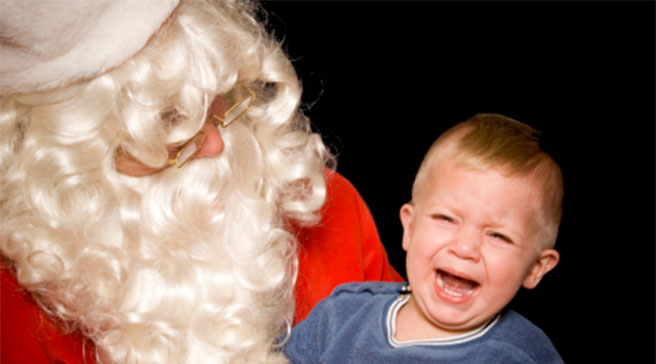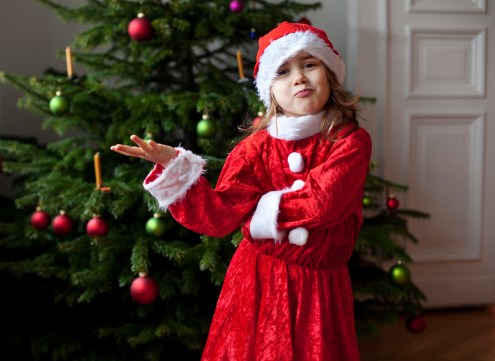Why are children scared of Santa?
Many children get scared when visiting Father Christmas’s Grotto – but what is it about this jolly figure that frightens them?

Kids scared of Santa? Father Christmas, Saint Nicholas; call him what you like, but the very mention of his name is usually enough to elicit a gleam of excitement from a young child – provided, that is, that he is kept a safe distance away.
Having worked in ‘Santa’s Grotto’ in my student years, I’ve seen many excited boys and girls queuing to see Father Christmas, and reel off their ever-optimistic list of gift requests, my favourite to date being the nine-year-old requesting a 3D-HD-TV as his parents looked at each other in panic.
But I’ve also noticed some children, usually under the age of four, who cry unrelentingly before they get to the grotto, only to become even more hysterical when they finally come face to face with the man himself. So what is it about this big, jolly, present-bearing, magical figure that triggers fear in the hearts of some children? Could the Uncanny Valley theory – the idea that near-human faces such as zombies are scary because our brains try to process them as humans – be applied to Santa?
‘Santa's bright red clothing, noisy grotto environment, and the pressure of being “good” to get a present are likely to contribute to a scary experience more than partial concealment of the face,’ says psychologist Stephanie Lay, who explains that our brains are unlikely to mistake Santa for anything else.
Emma Citron, consultant clinical psychologist, agrees that Santa’s famous outfit plays a part. ‘Younger children don’t tend to like dressing up, so when confronted with a fat man with a big white beard, they often can’t see behind the costume,’ she says.
Santa fear is similar to the common fear of clowns, adds Lay. ‘Santa and clowns both convey an expression of permanent jollity which might seem forced or unreliable and again, unsettling.’
According to Citron, the secrecy surrounding Santa, and the enclosed nature of grotto entrances, make the experience more magical for older children, but for younger siblings, it can add to the fear of the unknown and unpredictable. ‘Santa is the subject of many hopes, daydreams and wishes,’ says Citron. ‘He has taken on a god-like presence in our lives, looming so large over all our Christmas celebrations. Coming face to face with the man on whom you have pinned so many hopes can evoke such strong emotions, that the experience becomes completely overwhelming.’
There are still uncertainties about the way in which children process the idea of Santa. Citron cites children who have visited multiple Santas during one Christmas, with vastly different appearances or accents. ‘It’s not known how children reconcile these differences in their own mind,’ she says. ‘It’s possible that they have some inkling that Santa isn’t real, but don’t want to stop believing in the magic.’
Happily, upwards of the age of about four, the majority of children overcome their fear of Father Christmas and enjoy family trips to see him, sharing without hesitation their optimistically long present lists. And when our children do ask that question about the reality of Santa’s existence? Citron’s top tip is to give an answer along the lines of ‘He’s real for us if we believe in him’. This, Citron says, avoids lying to children, but leaves it open to their imaginations, allowing them to believe for as long as they want to.
Are your children scared of Santa, or were you scared as a child? Why do you think this is? Let us know on Facebook or tweet us @PsychologiesMag









